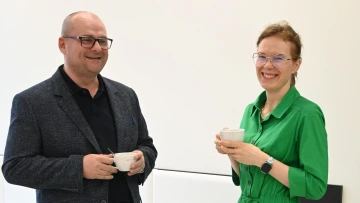How Our New Delivery Chief Builds Teams That Help Customers Succeed

What's behind long-term successful projects and satisfied clients? Not just technical skills, for sure. In the second part of our candid interview, Libor Kovář speaks openly about the values that shape ARTIN's corporate culture—reliability, the ability to quickly solve problems, and a responsible approach without micromanagement. You'll learn why ARTIN can create self-managing teams that adapt quickly and always deliver quality results.
Successful Teams Are Built on Reliability, Openness, and Performance
When Libor, our new CDO, reflects on what makes a team successful, he doesn't talk about technical skills or certifications. Instead, he emphasizes the human aspect.
"What's crucial when we want to move things forward is reliability—being able to rely on having open conversations with people, that colleagues don't take feedback personally, and that we collectively have one main goal in mind," says Libor.
In his view, a healthy team is one where people share successes and openly identify problems and look for solutions. "We clearly name things that don't work. Not to find someone to blame, but to find solutions. To evolve."
Realistic Approach and Perspective Are Additional Pillars
In his vocabulary, two key qualities frequently appear that he expects from his team: a sense of reality and perspective.
"A sense of reality means I understand that when a solution works here, it doesn't mean it works elsewhere. Every customer and their needs are different," explains Libor, adding: "Perspective means the ability to listen, communicate, and not take yourself too seriously. The customer is king—we're not important, the client is."
"We don't need to be visible; the client's results need to be visible. I stand by the principle of customer first, absolutely."
The Culture Behind ARTIN's Success
ARTIN is known for its open corporate culture where people can freely express their opinions. This suits Libor:
"I appreciate a culture that's open, fair, and honest. I'm very open and don't think politically. I would have a problem in an environment where I had to think about what I can say, where my words get twisted. That kills growth."
However, he emphasizes that open discussion must lead to unity in action:
"A team can tear each other apart in the meeting room, but what they agree on, they must then support together—they leave the room with a unified opinion. We're in the same boat, or the boat will sail away without us."
Besides openness, Libor also promotes a culture of performance: "I believe we're here to help the company grow. The company pays us and takes care of us; we reciprocate with performance—if the company dies, we don't have jobs, will we."
Responsibility Without Micromanagement
One of the key values Libor brings to ARTIN is trust in people and their abilities.
"I believe in responsibility without micromanagement. I want people to know what's expected of them, and then I let them do it. My role is to set strategy and direction," he says convincingly.
This doesn't mean he avoids responsibility. On the contrary, Libor clearly defines boundaries: "Listening to others is key for me. I draw inspiration and perspectives from their opinions that might not have occurred to me on my own. But the final decision and responsibility is something I retain."
How to Build Trust in a Team
For a new manager, gaining team trust is always a challenge. Libor approaches this with humility:
"Trust can't be forced. I have to earn it among people, and it takes time. Time that people need to discover that what I say and do makes sense. And that they can tell me things without me misusing them, and vice versa."
His approach is based on example: "I believe in leading by example. I have no problem showing vulnerability by being completely open myself."
What Does All This Mean for ARTIN's Customers?
Strong corporate culture and satisfied people aren't just internal matters—they directly translate into quality services for clients.
"The client must know that hiring us means gaining control, not losing it—working with us isn't an expense, it's an investment," explains Libor, adding: "I'm extremely loyal to both the customer and my company—I want these two to succeed."
When you ask Libor what he's looking forward to most at ARTIN, he responds: "When people start believing that what I do/say, I do sincerely, and understand that we're in this together, collectively building ARTIN's future. And when my proposed changes start bearing fruit."
And what does he think will be the biggest benefit for customers?
"I'm happy when I see that I believe in the same things as clients, even if I might talk about it in different words. It will be a ride. But there will be plenty of fun along the way."
Find out about why software houses must evolve and how to steer them in the most customer-centric direction possible in the first part of Libor's interview here.
